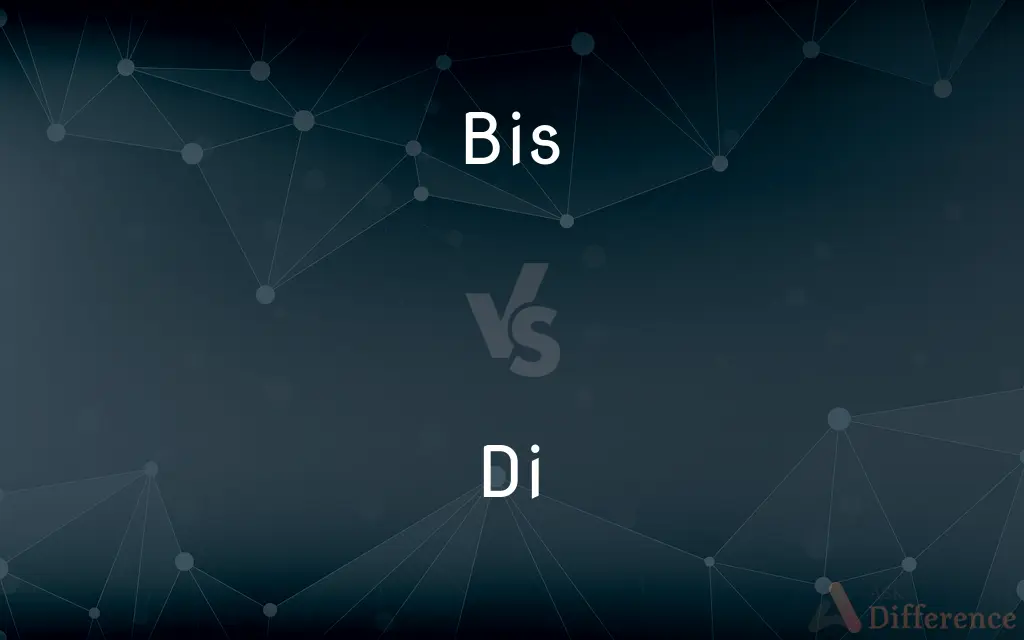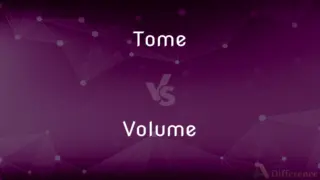Bis vs. Di — What's the Difference?
By Tayyaba Rehman — Updated on September 22, 2023
"Bis" often signifies repetition or twofold in various contexts, while "Di" is a prefix meaning two or double.

Difference Between Bis and Di
Table of Contents
ADVERTISEMENT
Key Differences
"Bis" and "Di" are both prefixes in the English language, though their usage and origins vary. "Bis" is derived from Latin and can mean twice or two times, signifying repetition. For example, in musical notations, "bis" indicates that a particular section should be repeated. On the other hand, "Di" originates from the Greek word "dis", denoting two or double.
In the realm of chemistry, "bis" is used to denote the presence of two identical groups or ligands in a compound. For instance, "bis(chloromethyl) ether" indicates the molecule has two chloromethyl groups. In contrast, "Di" in chemical nomenclature suggests the presence of two atoms or groups, as in "dichloromethane", which contains two chlorine atoms.
In the world of linguistics, "bis" appears in some languages to mean "again" or "repeat". For instance, in French, if a speaker wants an encore of a performance, they might shout "bis!" However, "Di" acts consistently as a prefix in various languages, always indicating two of something or a division, such as "dichotomy".
While both "bis" and "di" can indicate a factor of two or a doubling, their applications differ contextually. "Bis" tends to be more specific, especially in professional or scientific contexts, whereas "Di" is a more general prefix that spans various disciplines, from science to everyday language.
Comparison Chart
Origin
Latin
Greek
ADVERTISEMENT
Meaning in General
Twice or repetition
Two or double
Usage in Chemistry
Indicates two identical groups or ligands
Indicates presence of two atoms or groups
Linguistic Application
Used in some languages to mean "again" or "repeat"
Acts as a prefix indicating two or a division
Contextual Application
More specific, especially in professional contexts
General prefix spanning various disciplines
Compare with Definitions
Bis
Used to mean "again" in some linguistic contexts.
The audience shouted bis to hear the song once more.
Di
Denotes a division or split.
The issue presented a clear divergence in opinions.
Bis
A term indicating repetition.
The musical piece had a bis marking, instructing to repeat the section.
Di
A prefix indicating two or double.
The word dichotomy means a division into two parts.
Bis
Denotes something that is twofold.
The concert featured the main performance and a bis encore.
Di
Signifies a pair or duo.
Dinosaurs like the diplodocus roamed the Earth millions of years ago.
Bis
Signifies the presence of two identical groups in chemistry.
Bis(ethyl) ketone has two ethyl groups.
Di
Indicates two-fold nature in mathematics.
A digon is a polygon with two sides, though theoretically uncommon.
Bis
Again; twice. Used as a direction to repeat a passage.
Di
Refers to two atoms or groups in chemistry.
Dichloromethane has two chlorine atoms.
Bis
Used to request an additional performance.
Di
A meaningless syllable used when singing a tune or indicating a rhythm.
The chorus goes like this: "di di di di dum, da di da".
Bis
Inflection of bi
Bis
Twice; showing that something is, or is to be, repeated, such as a passage of music, or an item in accounts.
Bis
Twice; - a word showing that something is, or is to be, repeated; as a passage of music, or an item in accounts.
Bis
Indicates a second occurrence.
The meeting was scheduled for March 5th, bis, indicating a second meeting in the month.
Common Curiosities
Can "Bis" indicate something other than a factor of two?
Yes, in some contexts like music, "bis" can mean a repetition or encore.
Does "Di" always indicate a factor of two?
Yes, "Di" is a prefix meaning two or double.
Are "Bis" and "Di" interchangeable?
No, while both can indicate a factor of two, their usage varies based on context and discipline.
How does the word "Dichloromethane" use the "Di" prefix?
It indicates the presence of two chlorine atoms.
What's a linguistic example of "Bis"?
In French, shouting "bis" requests an encore performance.
Does "Bis" have applications outside of professional contexts?
Yes, particularly in languages where it can indicate repetition or encore.
Which prefix is more specialized in usage?
"Bis" tends to be more specialized, often used in professional or scientific contexts.
What is the primary origin of "Bis"?
"Bis" is primarily derived from Latin.
In which field is "Bis" commonly used to indicate identical groups?
In chemistry, "Bis" denotes two identical groups or ligands in a compound.
Is "Di" used in mathematics?
Yes, as in the term "digon" which refers to a two-sided polygon.
Do both "Bis" and "Di" have Greek origins?
No, "Bis" is from Latin, while "Di" is from Greek.
Can "Di" be seen in names of ancient creatures?
Yes, like "diplodocus", a type of dinosaur.
Does "Di" ever mean "repeat"?
Typically, no. "Di" usually indicates two or double.
How is "Bis" used in date notations?
It can indicate a second occurrence, like a second meeting in a month.
Can "Di" be seen at the start of common English words?
Yes, words like "divide" or "dilemma" use the "di" prefix.
Share Your Discovery

Previous Comparison
Amphitheatre vs. Theatre
Next Comparison
Tome vs. VolumeAuthor Spotlight
Written by
Tayyaba RehmanTayyaba Rehman is a distinguished writer, currently serving as a primary contributor to askdifference.com. As a researcher in semantics and etymology, Tayyaba's passion for the complexity of languages and their distinctions has found a perfect home on the platform. Tayyaba delves into the intricacies of language, distinguishing between commonly confused words and phrases, thereby providing clarity for readers worldwide.
















































